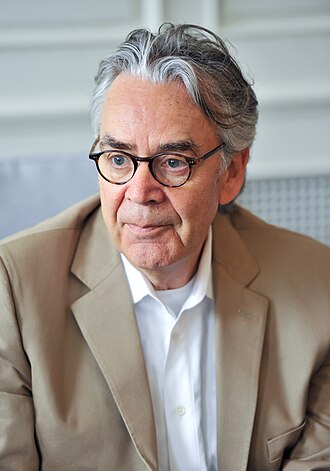 |
| Image via the Wik |
Howard Shore is perhaps the greatest living classical composer - at least that's what's said by three Academy Awards, three Golden Globe awards, and four Grammys. While filthy lucre is perhaps not the true measure of the composer, J. S. Bach and the great Beethoven himself found that reward to be quite consoling in their old ages.
The thing is, music here is in a supporting role. As such, it probably has to be more emotionally engaging because it is intended for a mass audience. Strangely, that makes it very likely a greater challenge than most "modern" Classical music that is commissioned by bureaucratic panels of Grey Faceless Men (and Women).
A cynic would say that since it must needs appeal broadly, it has to be good, not novel. And since modern art worships novelty uber alles, the Arbiters Of Taste® look down their trust fund noses at music like this. Everyone else loves it. See Academy Awards, Golden Globes, Grammys, etc. Not to mention box office take which at the end of the day drives the whole game.
It's quite interesting listening to this as the piece develops. The scene is a final farewell between good friends, a farewell that is sprung as a surprise. Horns sound, signalling time to board the ship that will take one of the company away for ever. The music takes on a melancholy as the friends realize that this is the final parting. The theme that Shore used throughout the three films for this companionship sounds, but in a restrained and yes, sad, way. Then the chord changes, with the introduction of a new theme, still melancholy from the parting, but with a note of something that can only be described as hope. The ship sails into the sunset, leaving the friends behind on the shore. Roll credits.
Our emotions listen to music as much, or perhaps even more than to the dialog on the screen. This is the full measure of those emotions. Not novel, but accessible. Classical music is very much alive and well, in the Cinema.
A little late for class today.
ReplyDeleteGreat essay on the association of music and the cinema. If the composers like Bach , Mozart , Haydn et al. had the cinematic medium as a adjunct to their music, imagine the results!
John Williams is right up there of course with his heroic themes and evocative scores. I watched Saving Private Ryan again after returning from our trip to Normandy, and Williams was able to stimulate the lacrimal glands with his themes. Gosh, isn't that one of the things that music is for?
Your thoughtful observations always make for a rewarding Sunday morning learning experience. I am always grateful that you do this.
Libertyman, I'm glad you like these posts. I always look forward to your comments.
ReplyDeleteEarlier in the same film that this music comes from is a scene in which the same sort of bittersweet parting is described, again with hope as the final motif:
ReplyDeletehttp://youtu.be/ZEbfLiOEM1U
The words "a far green country under a swift sunrise" came directly from Tolkien himself, but Peter Jackson inserted them into a scene that made them great.
One of my favorite parts of the trilogy, solely for the music. Nice choice...
ReplyDeleteHadn't thought of it in that way, but you're exactly right... Companion to the spoken and evoking the underlying emotions IS what he's done...
ReplyDeleteDefinitely one of the best soundtracks out there, I think.
ReplyDeleteI'll also put in a word for Murray Gold, who has done an excellent job for several years with the Doctor Who soundtracks.